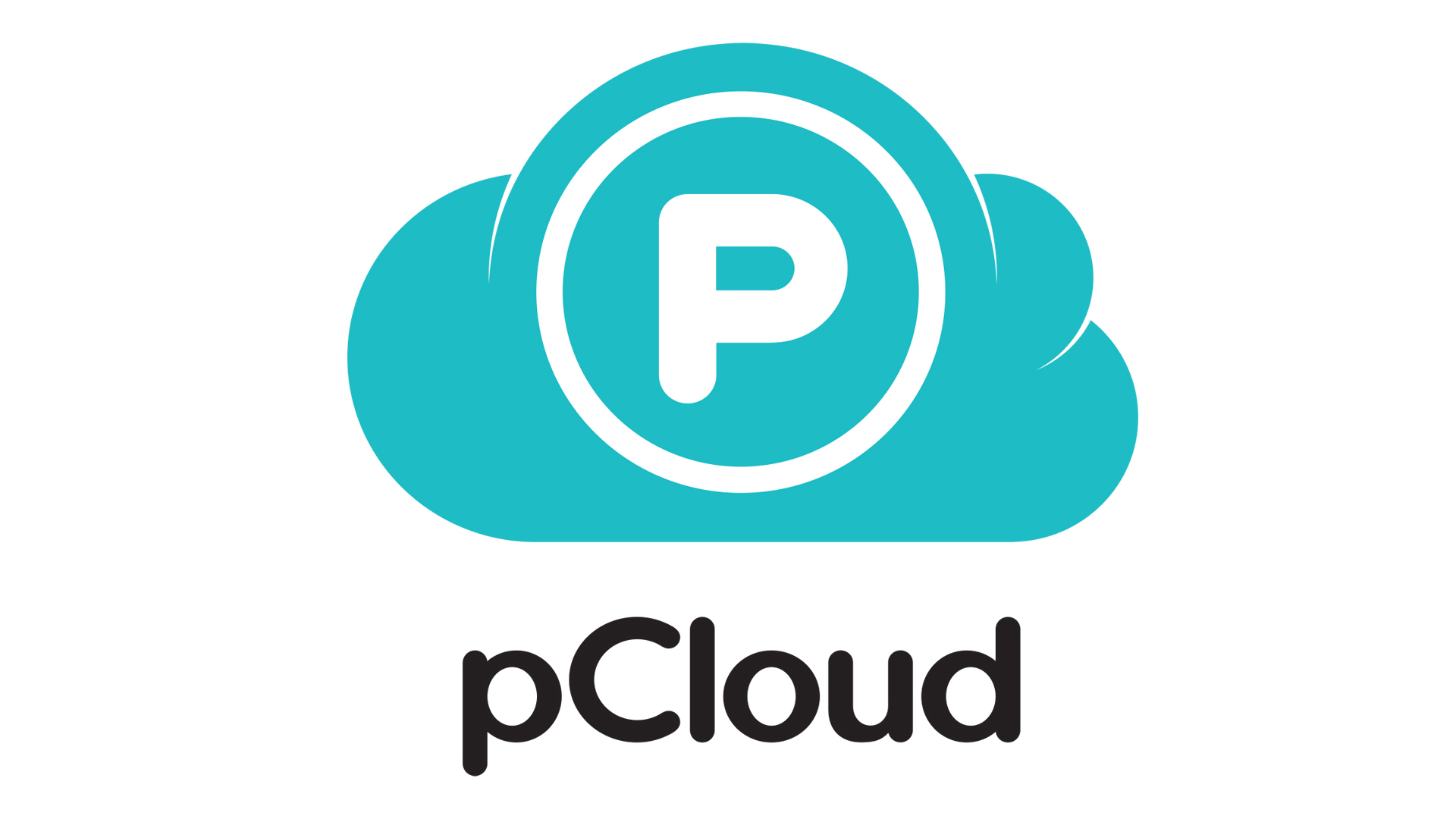Tom's Guide Verdict
pCloud offers an efficient way to keep your files stored and secure, but despite a couple of unique features, there’s not much more. It lacks the collaboration tools and smoother interfaces of competitors.
Pros
- +
10GB free storage
- +
Useful media players
Cons
- -
No document editor
- -
No collaboration options
- -
Some features are paid add-ons
- -
Limited support
Why you can trust Tom's Guide
For keeping your files organized and secure, cloud storage is an increasingly popular alternative to physical drives. The Switzerland-based pCloud may not be the most well-known, but is it one of the best cloud storage providers? In this pCloud review, we’ll see how it fares in the cloud storage market.
pCloud: Plans and pricing
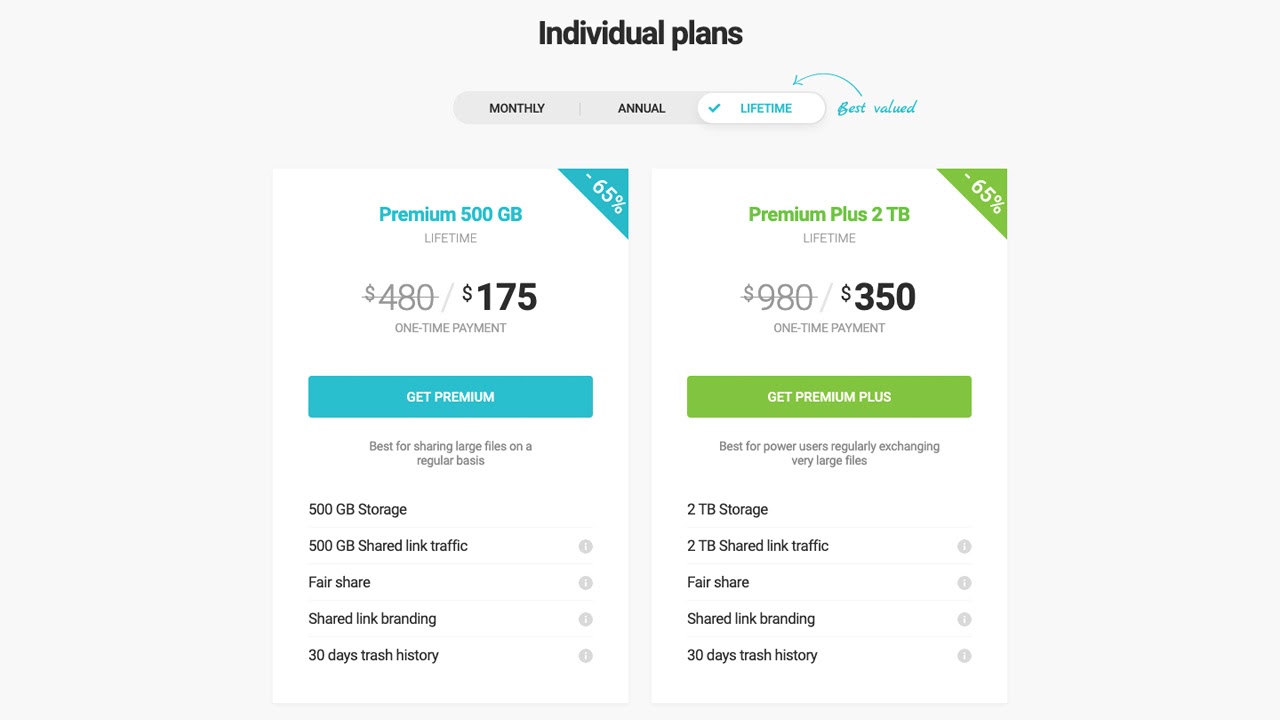
pCloud offers up to 10GB free, though to “unlock” all this space, you need to complete tasks such as downloading the desktop and mobile apps. For over 10GB, you’ll need a paid plan.
The pricing structure can be confusing, as there are a lot of options, and the website doesn’t make everything as clear as it could.
Within the individual plans, you can purchase a lifetime subscription, a nice cost-saving option that not a lot of other providers offer. A one-off payment of $175 will get you 500GB, or 2TB for $350. Alternatively, you can pay on an annual or monthly basis—$47.88 a year or $4.99 a month for 500GB, and $95.88 a year or $9.99 a month for 2TB.
With the family plan, you pay a one-off $500 payment for 2TB, which can be shared between five users. Though this includes some premium features, it’s not clear to us why it’s worth the significant additional cost over the equivalent individual plan.
And with the business plans, you pay $9.99 per user a month (or $7.99 if you commit on an annual basis) and get 1TB per user, for an unlimited number of users. However, you need to contact sales to set this up.
These prices were correct at time of writing, but may vary depending on available offers. Certain premium features, such as encryption and extended file history, have to be bought as add-ons, which further complicates the pricing.
Get instant access to breaking news, the hottest reviews, great deals and helpful tips.
pCloud: Features
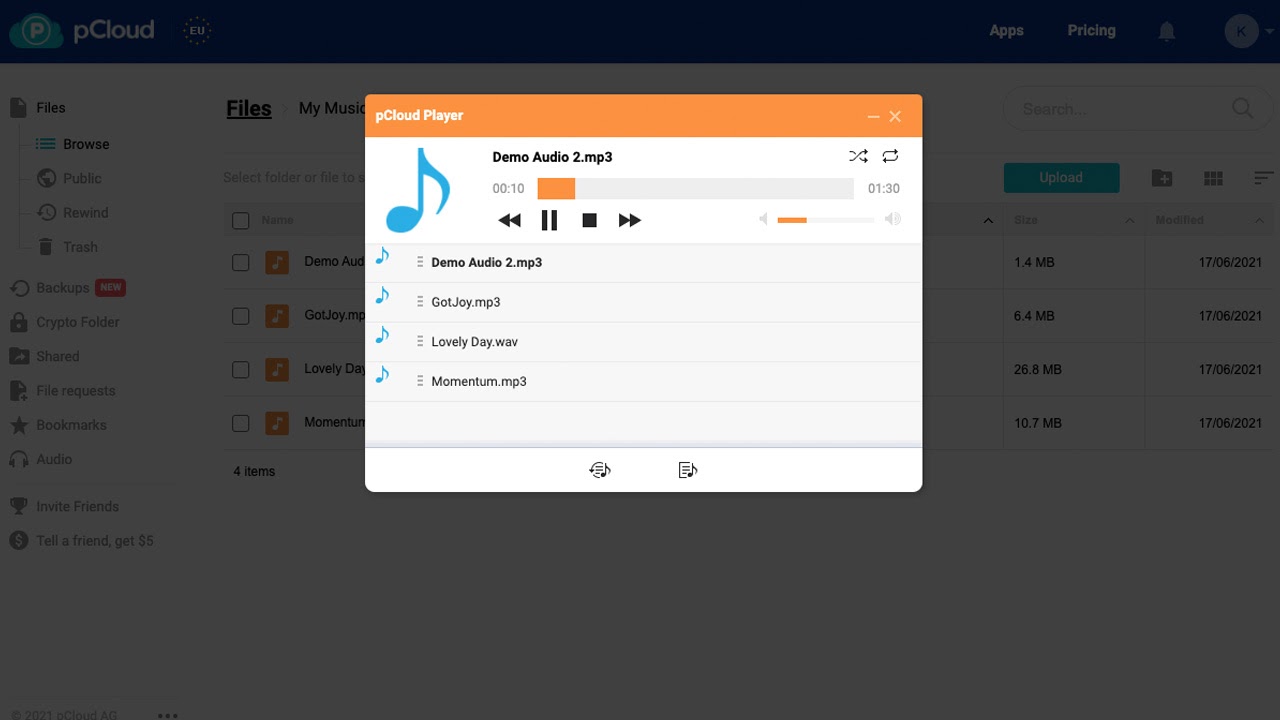
Not only can you play audio files from within pCloud, but you can also create playlists. So with the mobile app, you can listen to your playlists on the go. And the video player is impressive too, with a picture-in-picture mode enabling you to play videos while continuing other tasks.
With pCloud Rewind, you can see a preview of your pCloud account from a certain date in the past. From here, you can restore or download previous versions of files. It’s a little harder to access than with some competitors, as you have to rewind your whole account rather than clicking on an individual file to see previous versions, but it’s nonetheless useful.
You get 15 days of version history with the free plan, 30 days with paid plans, and up to a year with a premium add-on. If you upload a lot of content to Facebook or Instagram, then pCloud offers a social backup feature. Once you’ve linked your accounts, any photos or videos you upload to these platforms will automatically be backed up to pCloud.
Though pCloud lacks the collaboration tools of some competitors, it’s possible to share files using a link. Anyone you send the link to will be able to preview the file and, if you permit them, download it. You can also password-protect links and set expiration dates, and you can personalize the file preview page with your own cover image and message, which is a nice touch.
pCloud: Interface and in use
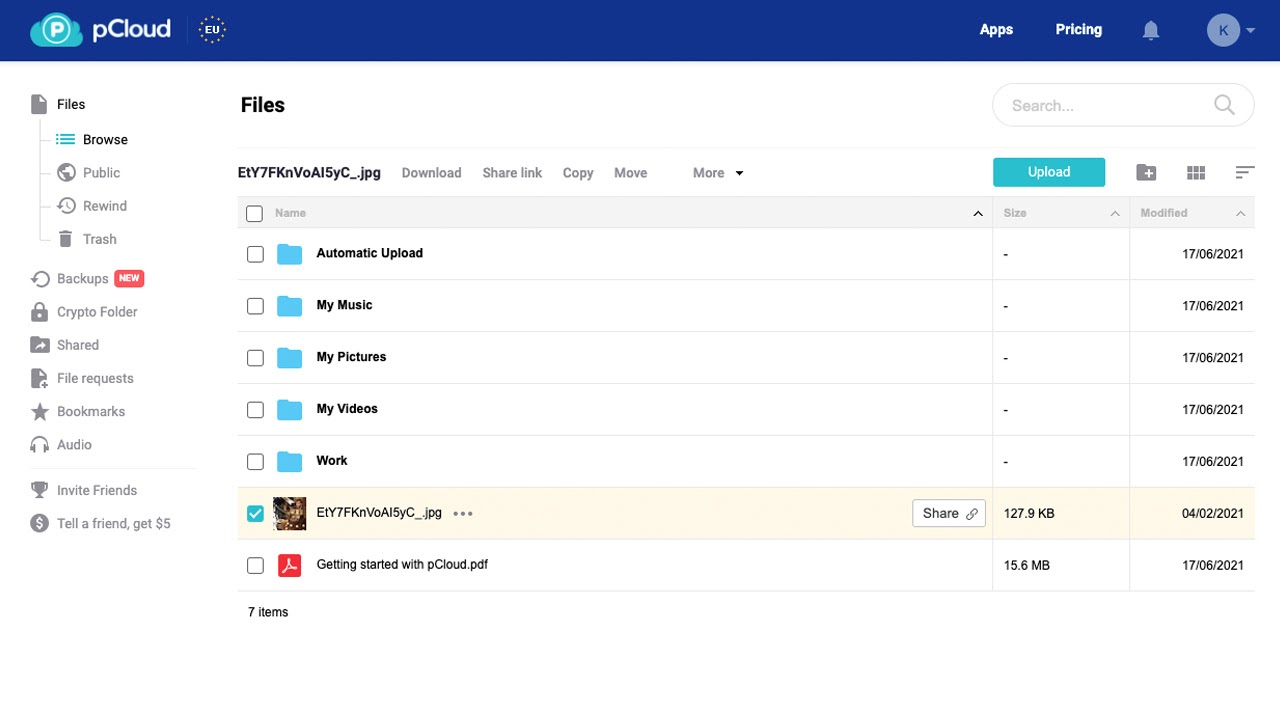
You can access pCloud from your web browser, a mobile app, and pCloud Drive, which is a desktop app that builds your pCloud folder structure into Windows File Explorer or Mac Finder as if were an additional hard drive. The syncing between the different interfaces is fast and efficient.
In the browser interface, you can navigate your files much like you would in an operating system’s file manager. To add files, you can drag and drop or use the upload manager, which allows you to keep track of larger uploads. A search function helps you locate files.
Overall, though, it’s not as smooth and elegantly designed as competitors like Google Drive and Dropbox—it’s tricky to move files around, as you can’t just drag and drop them between folders.
pCloud: Support
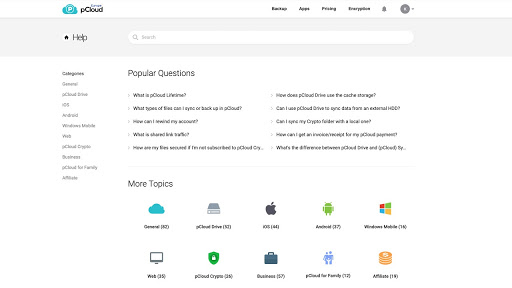
An FAQ section on the website includes advice on many issues you may have. If you need to get in touch with tech support, your options are limited to email or a web form, and replies can take a couple of days. The only phone number available is for the company’s Switzerland headquarters, which isn’t useful for customer support purposes.
pCloud: Security
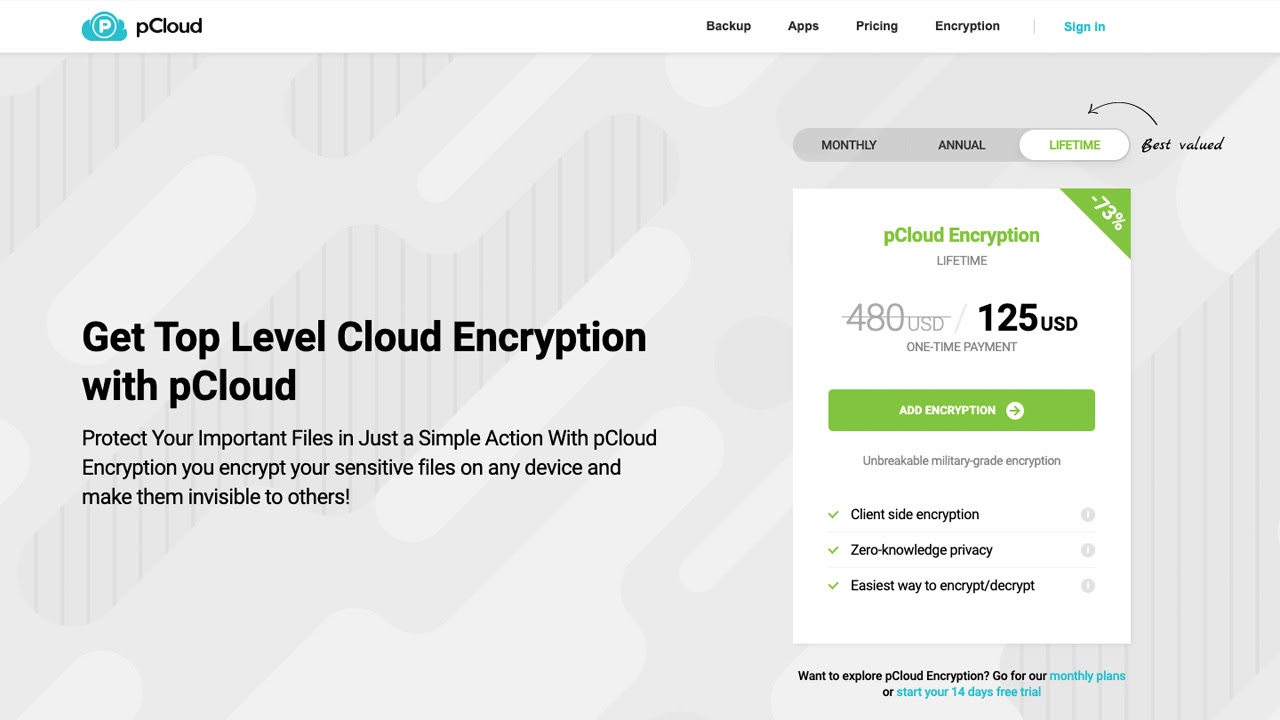
Through pCloud’s settings, you can add two-factor authentication to your account, and can monitor which devices you’re signed in on. pCloud also offers TLS/SSL (Transport Layer Security/Secure Sockets Layer) protection and 256-bit AES (Advanced Encryption Standard) encryption for all files.
For an added layer of security, you can subscribe to pCloud Crypto, an add-on which includes client-side encryption. This means that your files are encrypted before being uploaded. It’s an impressive tool that ensures only you—and no one else, not even pCloud employees or authorities—can access your files.
Alternatives to pCloud
One of pCloud’s main competitors is Google Drive. This gives you an impressive 15GB for free, and its paid plans are similar to pCloud’s, with 2TB costing you $9.99 a month or $99.99 a year.
It has a smoother, more intuitive interface than pCloud, and an impressive range of features, including collaboration tools and the ability to edit documents from within the web interface.
Another popular option is Dropbox. This offers less free storage—only 2GB—and its paid plans start at $11.99 a month (or $9.99 a month if billed annually) for 2TB. That’s a little pricier than pCloud, but, like Google Drive, it’s a better option when it comes to ease of use and range of features, including collaboration tools.
To learn more about the companies' business offerings, read our Drive Enterprise review and our Dropbox Business review.
pCloud: Final verdict
Offering a nice amount of free storage and reasonably priced, pCloud is a good way to keep your files stored and secure. It has a few useful features, such as the in-built media players and rewind function.
However, its sharing tools are lacking, there are no collaboration tools, nor is there an in-built document editor. When several competitors offer all of this plus a generally smoother interface, it’s difficult to recommend pCloud.

Kieron Moore is a freelance writer based in Manchester, England. He contributes to Future sites including TechRadar and Creative Bloq, focusing on subjects including creative software, video editing, and streaming services. This work draws on his experience as an independent filmmaker and an independent TV watcher. He can be found on Twitter at @KieronMoore, usually when he’s meant to be writing.





